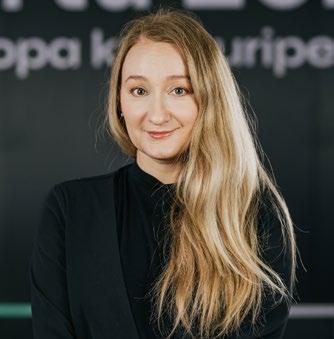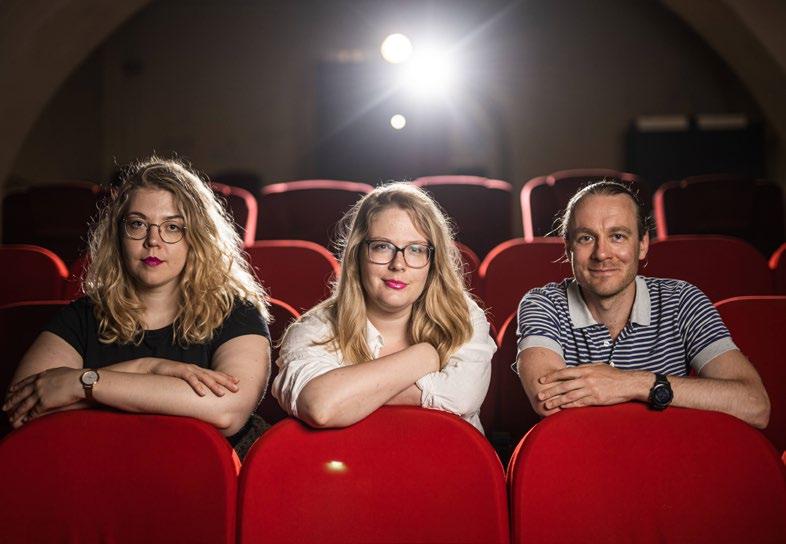
8 minute read
Event Docs in Tartu
Docs in Tar tu
Tartu, Estonia’s second largest city, will be the European Capital of Culture in 2024. This brings a lot of cinemarelated events to the small university town, including a documentary programme. We asked from Kaarel Kuurmaa, the head of the project, what exactly is in store.
By Maria Ulfsak Photos by Argo Ingver
Kaarel, what is the Arts of Survival Documentary programme and its film competition that you run in collaboration with the Estonian Film Institute? In December 2022 we gather ideas that have begun either in a Tartu filmmakers’ residency, or some other way, and invite the filmmakers to submit their short film treatment that would fit under a general title “Arts of Survival”. Our only requirement is that it should be shot in Tartu and / or Southern Estonia and it should be ready by the beginning of 2024. We have predicted the length of the short to be somewhere between eight and 22 minutes, but naturally it all depends on the topic, style, and technique. The Estonian Film Institute’s participation is essential, because it may happen that some idea would fly better as a full-length film, or a series, and would be more efficient if executed in some other format.
I understand that all the finished short films will be put together on an “Arts of Survival” compilation. What does the title mean for you personally, or what does it refer to? I like the concept of the Arts of Survival more and more. When I heard about it for the first time some years ago, it felt it was perhaps a bit too pessimistic and
Kaarel Kuurmaa
seemed to hint at some form of suffering and angst. But as time passes, it becomes more and more optimistic and joyful. Yes, it does encompass a strong ecological theme, but an additional strong political agency has emerged in my opinion. On the other hand, the overall title is wide enough to include sports, apps, handmade chocolate, or religion, if one is being creative. To each their own. As a curator of the project, I try to keep an open mind, but in the end, I feel like a film should make people’s lives better or more meaningful in some way.
Docs in Tar tu
Please explain further, what is the role of those documentaries in the general programme of the European Capital of Culture Tartu 2024? In 2024, when Tartu with Southern Estonia carries the title of European Capital of Culture, a lot of exciting events will be taking place here, in one of the most vibrant Estonian cities. Artists and creators will gather from all over the world; and filmmakers are sort of pioneers, who have already completed their main task by the beginning of 2024. The films have been completed by then, because the main objective of our project is to show Tartu becoming the European Capital of Culture, and life in Tartu through the preparation period of the previous year. So that we’d have a visual document of life before 2024. As the title year is probably more festive and special, with a lot of events, our docs are aiming to observe something else. Real life, perhaps. Different modes of living. This selection will hopefully make an exciting whole, with eight different author’s visions, which tell us about something more than just one film. On one hand, every short film is an exciting piece of art on its own, but it is my hope that it’s the compilation, knitting together works from Estonian and foreign filmmakers, that will make an impact. There is a term used in Anthropology and Social Sciences in general to describe that kind of practice – the so-called emic and etic method, where fieldwork can be approached both from the inside, as a member of the group, or from a knowingly outsider position. Every documentarist knows that creating a field of tension is a natural part of the filmmaking process.

Open air cinema in Tartu.

Kati Ilves,
TARTU 2024 ARTISTIC DIRECTOR I am writing this on the same day when Jean-Luc Godard, one of the greats of cinema, and a pioneer of the French New Wave, passed away. In cinema, and maybe culture in general, there’s not many people uninfluenced by Godard, directly or indirectly. Authors with such kind of significance exceed time and disciplines. Their departures are significant too, because they force us to summarize the new situation and ask, what to expect from cinema or culture next?
I’m very happy that cinema has such a central presence in the European Capital of Culture Tartu 2024 programme, via Arts of Survival Documentaries, for instance. The presence is substantial because the emphasis is on strong authors, who are free to improvise on the theme of Tartu and Southern Estonia, giving them complete artistic freedom. One of the main themes of the Tartu 2024 Arts of Survival creative concept could also be the survival of the so-called independent art in a world that becomes more and more professional. It is very important that the artists maintain their voice and creative handwriting, and all kinds of result-based expectations would not diminish their scope or creative ambition. Setting boundaries to art is a paradox – first, everybody’s biggest dream is to experience a piece of art that would change the world, a gamechanger in any given field of art, like Godard was once with his works. We can only support, endorse, and value such projects – when project managers set goals for art, then muses, or authors, laugh in the great beyond.
In order to make a conscious attempt to break this tension, it was our plan from the beginning to have 50% of the films in the line-up made by foreign authors who maybe see something about us that we cannot notice ourselves, and the other half by authors living in Estonia, who want to express what is important from the inside perspective.

A lot of residencies are happening, and are about to happen soon in Tartu, visited by some really big names in the European documentary world. Please tell us, who are the participants, what have they done here, and what are your plans for the future? Also, why those filmmakers, and what were your requirements for choosing them? It’s been most surprising that the film industry is almost devoid of this kind of residency opportunities that are so commonplace in art and literature, where there are hundreds of offers all over Europe to take a brief break from creative activities, or the opposite, initiate a period of active work. My residency invitation, has in that sense, come as a very positive surprise to the filmmakers, and

hopefully we see becoming an organic part of the film world in the future. When conceptualizing the
“Arts of Survival” short film cassette, we expressed a wish that next to the Estonian directors, interesting creators from abroad would come to make a film in South Estonia. In order to give them some sort of starting point, and a general idea of what lies ahead, we formulated the project in two parts, where the film production is preceded by an open and informal residency for strong and intriguing directors. I want to specify that we’re talking about creators with an interesting vision here, rather than simply “top directors”. Although, yes, they’ve all made documentaries in the past. There are also theatre or opera directors, or authors who have made TV series and fiction films. In any case, the main criterion for selecting participants was their previous work. I have worked as a programmer for different festivals for 15 years, and it’s only natural you develop favourites over time and establish a set of directors to keep an eye on. I also asked the advice of Estonian filmmakers, who they think should participate. On the other hand, it was never my intention to come up with some sort of “Best of the best” selection, but I wanted the younger generation to be represented too, for example, who might only have one or two strong films to show so far. Of course, there were bigger names who couldn’t participate due to the lack of free time, but quite a few intriguing authors have spent, or will come to spend some creative time in South Estonia, like Marc Isaacs, Viesturs Kairiš, Jerzy Sladkowski, Virpi Suutari, Carl Olsson, Andris Gauja, Einari Paakanen, Filip Remunda, Andrey Paounov, Aku Louhimies, Aliona van der Horst and Uljana Osovska. We can say that every one of them is searching for their own thing, or a way, to synchronize that “own thing” with the themes, people, events, or coincidences encountered in the cultural capital space. It seems at the moment, that the filmmakers are intrigued by the so-called “border state” theme, seeing Southern Estonia as a crossroads between different cultures and religions. It is especially surprising for the foreigners to encounter smaller subcultures like the old believers’ community on the coast of Lake Peipus, or Võru region, who have managed to preserve and improve their own distinctive culture over the centuries. But there are also directors who are here to look for the majesty of the Cosmos, or look to Estonia’s eager faith in education, or our proximity to nature for inspiration. EF
The team of the Arts of Survival Documentary programme. From the left: Liisa Nurmela, Anna-Liisa Ingver and Kaarel Kuurmaa.











